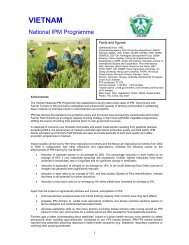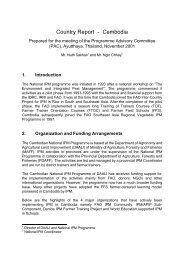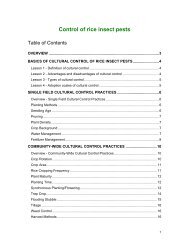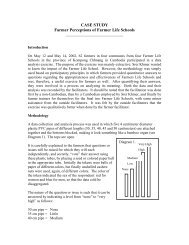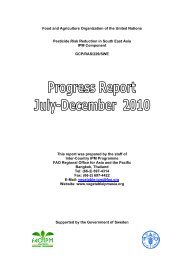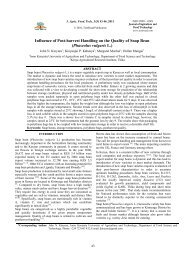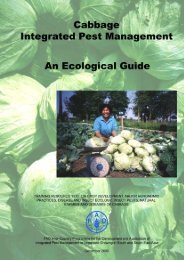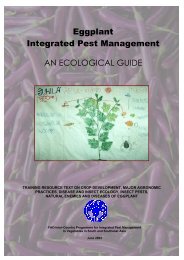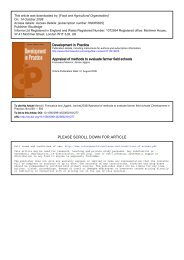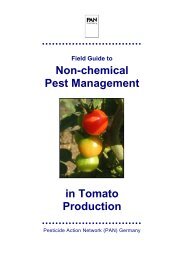pdf, 294 kb - Vegetableipmasia.org
pdf, 294 kb - Vegetableipmasia.org
pdf, 294 kb - Vegetableipmasia.org
- No tags were found...
Create successful ePaper yourself
Turn your PDF publications into a flip-book with our unique Google optimized e-Paper software.
TOT’s was in itself an important innovation.) By mid-1990, over 50,000farmers had participated in the first set of FFS’s in Indonesia. The IPMFarmers Field School had started on its way to becoming the single mosteffective new approach to farmer education in Asia. At the 1999 regionalmeeting of countries who make up the membership of the FAO CommunityIPM Programme, extension education expert Niels Roling, stated that:“IPM FFS is the model for farmer education across the world.Other extension methods have been exposed as lacking thecapacity to provide the education that farmers require in theincreasingly complex agricultural systems that they manage.”(FAO Community IPM Programme, 1999)Policy Support. IPM and FFS implementation were supported by a fairlycomprehensive policy promulgated in 1986 by then President Suharto. Thenew policy departure resulted from concern over:• Another major BPH outbreak that had occurred in 1986;• The threat that the outbreak would result in large imports of rice;• The impact of imports on dwindling foreign currency reserves;• The potential embarrassment these imports would cause for a nation thathad declared itself self-sufficient in rice production and was not able tomaintain this position.Scientists were able to persuade several ministers of the ineffectiveness ofintensive insecticide use (notably, the department of agriculture remainedunconvinced). The scientists proposed an IPM programme based on a farmlevel IPM strategy, IPM training for technical personnel who would trainfarmers, and limiting the availability of broad-spectrum insecticides. The interministerialcoalition supported the proposal and took it to the president. Theresult was Presidential Decree No. 3, 1986. The decree called for farmer andfield worker IPM training, the banning of 57 broad-spectrum insecticides fromuse in rice production and the eventual elimination of subsidies forinsecticides (Oka, 1991). The decree created a policy environment at alllevels of government that ensured support for rice IPM FFS implementation.2.5 The Spread of FFS ImplementationFarmers throughout the region have responded enthusiastically to IPM FFS’s,wherever they have been <strong>org</strong>anised. Some farmers are primarily motivated bythe reduced costs and reduced production risk obtained through application ofecological principles to crop management. Some are intellectually stimulatedby the subject matter and excited by the experience of designing and carryingout their own experiments. For others, the main attraction is the groupinteraction, discussions, and debates that are an important part of every FFS.The most striking confirmation of this enthusiasm has been the spontaneousappearance of “Farmer to Farmer” FFS, in which field school graduates beganto <strong>org</strong>anise season-long FFS for other local farmers.18



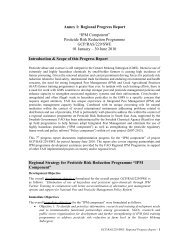
![Section 4 [ PDF file, 252 KB] - The Field Alliance](https://img.yumpu.com/51387260/1/158x260/section-4-pdf-file-252-kb-the-field-alliance.jpg?quality=85)
